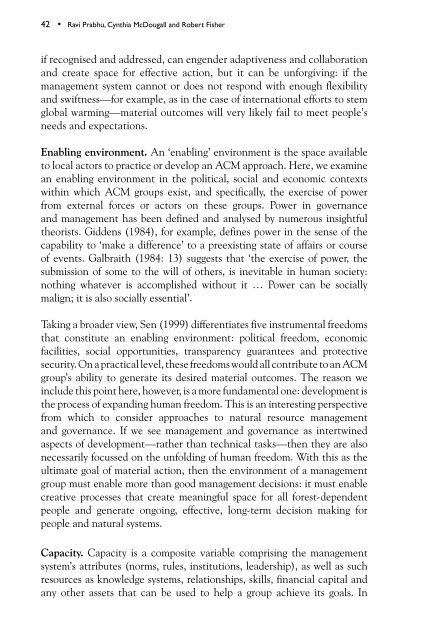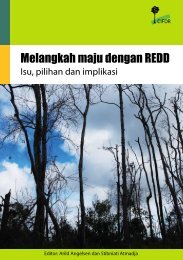Adaptive collaborative management of community forests in Asia ...
Adaptive collaborative management of community forests in Asia ...
Adaptive collaborative management of community forests in Asia ...
Create successful ePaper yourself
Turn your PDF publications into a flip-book with our unique Google optimized e-Paper software.
42 • Ravi Prabhu, Cynthia McDougall and Robert Fisher<br />
if recognised and addressed, can engender adaptiveness and collaboration<br />
and create space for effective action, but it can be unforgiv<strong>in</strong>g: if the<br />
<strong>management</strong> system cannot or does not respond with enough flexibility<br />
and swiftness—for example, as <strong>in</strong> the case <strong>of</strong> <strong>in</strong>ternational efforts to stem<br />
global warm<strong>in</strong>g—material outcomes will very likely fail to meet people’s<br />
needs and expectations.<br />
Enabl<strong>in</strong>g environment. An ‘enabl<strong>in</strong>g’ environment is the space available<br />
to local actors to practice or develop an ACM approach. Here, we exam<strong>in</strong>e<br />
an enabl<strong>in</strong>g environment <strong>in</strong> the political, social and economic contexts<br />
with<strong>in</strong> which ACM groups exist, and specifically, the exercise <strong>of</strong> power<br />
from external forces or actors on these groups. Power <strong>in</strong> governance<br />
and <strong>management</strong> has been def<strong>in</strong>ed and analysed by numerous <strong>in</strong>sightful<br />
theorists. Giddens (1984), for example, def<strong>in</strong>es power <strong>in</strong> the sense <strong>of</strong> the<br />
capability to ‘make a difference’ to a preexist<strong>in</strong>g state <strong>of</strong> affairs or course<br />
<strong>of</strong> events. Galbraith (1984: 13) suggests that ‘the exercise <strong>of</strong> power, the<br />
submission <strong>of</strong> some to the will <strong>of</strong> others, is <strong>in</strong>evitable <strong>in</strong> human society:<br />
noth<strong>in</strong>g whatever is accomplished without it … Power can be socially<br />
malign; it is also socially essential’.<br />
Tak<strong>in</strong>g a broader view, Sen (1999) differentiates five <strong>in</strong>strumental freedoms<br />
that constitute an enabl<strong>in</strong>g environment: political freedom, economic<br />
facilities, social opportunities, transparency guarantees and protective<br />
security. On a practical level, these freedoms would all contribute to an ACM<br />
group’s ability to generate its desired material outcomes. The reason we<br />
<strong>in</strong>clude this po<strong>in</strong>t here, however, is a more fundamental one: development is<br />
the process <strong>of</strong> expand<strong>in</strong>g human freedom. This is an <strong>in</strong>terest<strong>in</strong>g perspective<br />
from which to consider approaches to natural resource <strong>management</strong><br />
and governance. If we see <strong>management</strong> and governance as <strong>in</strong>tertw<strong>in</strong>ed<br />
aspects <strong>of</strong> development—rather than technical tasks—then they are also<br />
necessarily focussed on the unfold<strong>in</strong>g <strong>of</strong> human freedom. With this as the<br />
ultimate goal <strong>of</strong> material action, then the environment <strong>of</strong> a <strong>management</strong><br />
group must enable more than good <strong>management</strong> decisions: it must enable<br />
creative processes that create mean<strong>in</strong>gful space for all forest-dependent<br />
people and generate ongo<strong>in</strong>g, effective, long-term decision mak<strong>in</strong>g for<br />
people and natural systems.<br />
Capacity. Capacity is a composite variable compris<strong>in</strong>g the <strong>management</strong><br />
system’s attributes (norms, rules, <strong>in</strong>stitutions, leadership), as well as such<br />
resources as knowledge systems, relationships, skills, f<strong>in</strong>ancial capital and<br />
any other assets that can be used to help a group achieve its goals. In
















